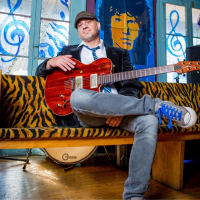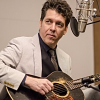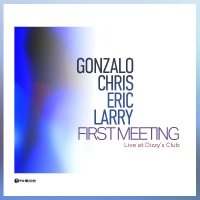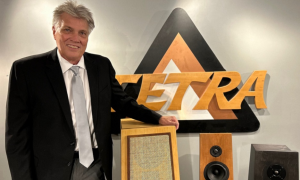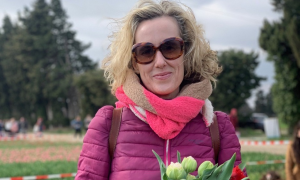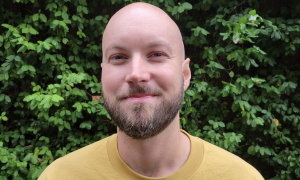Home » Jazz Articles » Chats with Cats » The Jazz Innovator: Jerald Miller
The Jazz Innovator: Jerald Miller
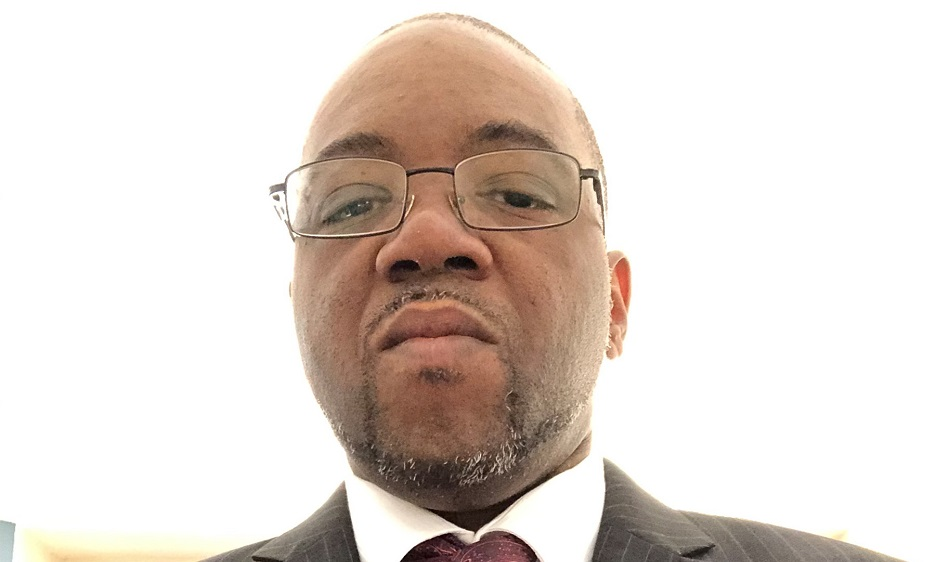
I see the most opportunity in the business of jazz for those artists who can master technology and realize that there is a new economy for content creators.
—Jerald Miller
With this in mind, I spoke to someone who has been at the forefront of helping to drag the jazz business into the modern era. Jerald Miller has worked his way through the industry in various facets but has always been at the forefront of utilizing technology to make jazz viable. Case in point is Jazz-Con, a jazz conference that he's producing later this year. An industry conference is nothing new, but this one will be completely virtual and open to anyone around the world, something not seen before in this field. Mr. Miller shared with me his journey through the business as well as his thoughts on why so many are falling behind in this age.
About Jerald Miller
Jerald Miller is a music-industry innovator and founder of Nu Jazz Entertainment, the first digital-first jazz label to pioneer prepaid download cards, video albums on iTunes, and the genre's inaugural iTunes LP release. Named one of Musical America Worldwide's "Top 30 Influencers," Miller has spent nearly thirty years helping artists and arts organizations monetize intellectual property, expand audiences and navigate emerging tech—from streaming and metadata to AI-driven rights management. As executive director of Jazz-Con, he champions jazz and classical music as commercially vibrant, globally unifying art forms for the 21st century.All About Jazz: What is your background and how did you get into the jazz business?
Jerald Miller: I got into the jazz business by way of the music business itself. In college I interned at EMI Records in the A&R Administration and picked up things naturally. From there, I did an internship at Columbia Records which was where I connected with Lauryn Hill, whose group the Fugees, were just releasing their first album. I was in the Black Music Department and, as it happened, had met one of her family members years earlier who was a roadie for a jazz musician. I excelled there and, after showing diligence, the Director of Promotions at the time gave me an assignment to write a radio promo plan for a new group they had coming out called "Criss-Cross." I did that and he liked it so much that he sent it to the Vice President of Columbia Records.
At the time, Columbia Records still had their Jazz division and I used to go down, pick the brains of the staff and product managers there, and watch what they did. It was a major operation at that time. From there, I met an A&R guy by the name of Steve Stoute and I convinced him to hire me to do the marketing for a new artist he had. While in the office one day, he introduced me to two new producers that he hired which happened to be Pharrell Williams and Chad Hugo. We became friends, connecting over our mutual love of music including jazz, believe it or not.
Next, I was hired by Mercer Ellington when he needed a road manager for the Duke Ellington Orchestra. While working at a gig, I met Bob Karcy of V.I.E.W. Video who told me he had been thinking of starting a record label. I told him I could help with that, and he hired me to help him build what became Arkadia Records and Arkadia Jazz. Early on, he signed Dr. Billy Taylor, Benny Golson, Dave Liebman, JoAnne Brackeen, and many others. That was where I produced my very first album for Dr. Billy Taylor. I was twenty-one at the time.
Within the next twelve months I worked on albums for Benny Golson, David Liebman, and others. Shortly thereafter, Mercer Ellington passed away and the family asked me to step in and manage the estate on an interim basis. By that time, I was on Lauryn Hill's management team and also managed an artist on the Blue Note label. That was where I got to know Bruce Lundvall. Before he passed, I asked him why, whenever I called him at Blue Note and asked him for a meeting, he always made the time. He told me that they had a lot of young players on the roster but no artist managers who were also young. He said that because I worked at another record label and actually had major retail accounts, I understood that the act of selling music wasn't just an afterthought but my main purpose. That was something I truly appreciated.
AAJ: Were you, or are you, a musician yourself?
JM: I fell into music early. By third grade I was playing the violin; a few years later the saxophone lured me in. Both instruments stayed with me until high school, when I stumbled onto jazz and felt it lodge itself in my spirit. I practiced nonstop, took every lesson I could find, and at aged fifteen I met Wynton Marsalis. That encounter rewired my future.
Back then, Fort Worth had an ahead-of-its-time venue called the Caravan Of Dreams—theater, art gallery, recording studio and a jazz room that booked the world's best; Dizzy Gillespie's United Nations Band, Stanley Turrentine, Jon Faddis, and Wynton's sextet with Wessell Anderson, Todd Williams, Marcus Roberts, Reginald Veal and Herlin Riley. After one set I mustered the nerve to introduce myself. Wynton said, "Come back tomorrow and bring your horn." That single invitation altered everything. Wynton and his band took me under their wing, proving that hard work and openness can turn admiration into apprenticeship. Each time they returned—about every eight months—he held me to my word: practice, improve, sit in. Eventually I was onstage in the middle of the septet, playing music from The Majesty of the Blues. As high school ended, Wynton urged me to study with his father, Ellis Marsalis, who had just launched a program at the University of New Orleans. And that, as they say, was the moment a teenager's hobby became a lifelong path.
AAJ: You've been on the forefront of combining technology with music distribution. Tell me about what you've done with your label Nu Jazz Entertainment.
JM: Well, Nu Jazz Entertainment has been around since 1995 and started as a production company. Back then, we produced a cable TV show in Staten Island called Real Jazz. I decided, at the time, that I wanted to spell "new" in a different way, so I spelled it "NU." Later, they coined the musical term "Nu Jazz" to define a whole genre, but it really started with me. It was just the name of a company to show that we were the new front line in the business.
That was also the company name I used for all of my projects related to artist management and promotions in the music business. In 2008 I decided that I wanted to start a music label, so I broke the brand up into separate divisions. There was Nu Jazz Records, which was the label. There was Nu Jazz Video, which did video. And there was Nu Jazz Publicity, which did the publicity work, and so forth.
Most of the things that I started with Nu Jazz was because I saw a need for it in the industry and no one else was doing it at the time. For example, we ran our first Facebook ads in 2008. At the time, no jazz music-related companies were even on Facebook. We had to set up a system of doing things because nobody we knew in the music business was running ads, let alone in the jazz world. In 2009, Facebook expanded their ads to allow international targeting, so Nu Jazz Entertainment began running ads for performances and album releases in other languages, targeted to international territories. We still do this to this day.
We started our label wanting to do things differently, so we started it as a digital only label. Through early partnerships with Apple, we capitalized on what we saw as a promising future of music. I decided I wanted to launch all of my digital albums with music videos, so I also created that kind of content. I gave different versions of the albums to different DSPs (digital streaming platforms).
In 2009, I developed the iTunes LP and pitched Apple on the idea. Eventually, they approved it but it took a while to develop. The process was made longer by the fact that I had come up with ideas that Apple's coding would not always allow us to do. A few times, I had to go back and sell Apple on my ideas. Two or three times they actually changed their coding in the software to allow us to put in features that we really wanted, but that the software did not allow.
From there, in 2011, we developed special relationships with people at services like Spotify, Deezer, and Pandora. It went on from there. We were never really a music distributor, per se. We went through an Indie distributor at that time, then Universal Music Group, and now Virgin. But we have some exciting news that we will be announcing soon for jazz musicians worldwide on that front.
AAJ: You're presenting a jazz conference in September. Tell me about it and how it's different from others around?
JM: For years, I have been going to jazz conferences around the world. If you name one, there is a good chance that I've been a speaker there or have created a panel for it. And, it hasn't just been jazz conferences. If the big music conferences want someone in the jazz and classical world, they often call me. But I've never really seen other jazz people at these conferences if it was not genre related.
Jazz and classical music has perennially been fifteen to twenty years behind the times in everything. I remember when I went to, what would be, the last IAJE conference, there was a heated argument about how to bring CDs back. I told people that that horse had left the barn—a lot of people thought I was loco.
It was then that I thought, "Man, you don't ever hear any relevant information at these conferences." It was a group of people doing equally as bad, reinforcing the things others do just as badly, to achieve the same results. It's almost like the old adage, "The blind leading the blind." I came up with the idea for this conference a few years ago but I really did not have the time to put it together. The technology really wasn't in place to do the type of event that I wanted. I wanted something where people did not have to come up with thousands of dollars to go to one location only to catch pieces of irrelevant conversations because they had to get to another session.
I didn't want to celebrate one hundred years of this person's birthday. I did not want to focus on how you teach music performance. I wanted to do things that would teach musicians different skill sets and shift their mindset from mere survival mode to a belief that they could thrive. This conference is designed to focus on the business side of music for jazz musicians. It's meant to push their thought processes forward and to expose them to new ideas in the music industry and the creative community as a whole. The creative community has gotten very innovative in the past ten years, but the jazz community has been left behind.
This conference is meant to disrupt the normal pattern of the establishment. For example, we have a panel called "The Real Business of Jazz." I created this panel specifically as an answer to my lectures that I give at colleges and universities. Higher education has institutionalized the process so much that it makes people's career paths very limited in scope. They teach people how to become impeccable musicians, but they don't teach them how to build sustainable careers outside of teaching.
While in the past year everybody has had panels on AI, none of the other conferences has even touched on topics of how jazz musicians can use AI to work smarter and not harder. We have another panel entitled "Playlisting here, Playlisting there, Playlisting, Playlisting everywhere."—because in the modern music business, streaming services rule. When labels survive, it's because they have received significant placement on someone's playlist. So how can an independent artist break into this in actionable ways? Well, that's what this panel is designed to answer. We are bridging the gaps between communities and ideas with Jazz-Con. We have five-minute video segments called "Jazz-Con Jam Sessions" where we feature one product, one person, or one organization that we feel deserves wider recognition in the larger jazz community.
Since jazz is loved around the world, we are using technology to stream all of the sessions. And, if you are in a different time zone, you can go back and watch the video at your own leisure. We will also be automatically translating the video into over ten languages in addition to having a session that will be hosted in Spanish and Japanese.
Inside of that, a new organization called JazzPacific is sponsoring a networking room for musicians and organizations from Pacific countries who want to connect. We also have an online gathering entitled the "Jazz Impact Symposium," that is designed as a meetup for jazz non-profits from around the world to connect, exchange information, and encourage ideas for "artist exchanges" inside the scope of their own existing programming.
So, Jazz-Con is just connecting the dots. where we can attempt to build a more cohesive jazz community around the world.
AAJ: What are some of the most pressing issues in jazz that will be addressed at the conference?
JM: There are several pressing issues in jazz that will be addressed by Jazz-Con. But the most pressing one I have seen for a very long time, is the issue of metadata in jazz. What twenty-five years of dealing with metadata has taught me is that the demands of the data are incessantly changing. Let me give you an example.
When the industry first started out, little more was needed than the simple metadata that would typically be encoded on a CD or placed in the liner notes. Then, as technology shifted, and Siri, Alexa and the like came forth, the need for different strands of metadata emerged. So, imagine someone is sitting at home on their couch and they say, "Alexa, play me a song from Sarah Vaughan." If you are a vocalist and made a tribute album to Sarah Vaughan, how will the algorithm be able to identify that if it wasn't in the metadata fields?
Jazz people have committed an egregious error by having a "Set it and forget it" mentality. The metadata requirements are changing constantly, and the jazz genre has no standardized practice to develop this. Classical music did it almost ten years ago and it has been a boon for moving classical music forward in the digital landscape. Jazz music needs this. But none of the other large jazz organizations has even proposed it, despite some of them having budgets in the tens of millions of dollars.
Jazz-Con is taking these ideas to the masses. It's time to take the power from the few and give it to the many. There are many other issues, but the main ones revolve around showing artists that they don't have to be tied to the limitations of the past and that the futures of jazz musicians are tied to the rise of the content creators that we are experiencing.
AAJ: How can musicians, music business folks, and the general public participate in this?
JM: It's really easy to find out how you can participate. Just visit Jazz-Con's website, or search EventBrite for "Jazz-Con." There will also be a limited number of full and partial scholarships available, for students and musicians with economic challenges, from our partner organization JazzMetroplex. If anyone is interested, they can email [email protected].
AAJ: Where do you see the most opportunity in the business moving into the future?
JM: I see the most opportunity in the business of jazz for those artists who can master technology and realize that there is a new economy for content creators. Those who can adapt, repurpose, and find ways to better engage their content on meaningful platforms will find the most success.
I also see opportunities for artists to grow audiences while better utilizing their content catalog of previously released material. Going back to the "Set it and forget it" mentality, artists often think that once they release their album it becomes "old" after a few years. But, to someone who has never heard it, and is hearing it for the first time, it's new. There are substantial opportunities to have new fans discover your music all the time. There is a tremendous opportunity for those who never lose sight of that fact.
AAJ: Who are your favorite jazz artists?
JM: The jazz musicians I cherish most are the ones who felt completely at ease in their own skin. Milt Hinton and Mona Hinton always introduced me as their "grandson," so I grew up around the elders of the music. That was a gift: legends who revealed their humanity, generosity, and genuine friendship.
They all had impeccable social grace and distinct personalities. When I think of my favorites, it's not about notes or solos—it's about who they were as people. From Mercer Ellington to Milt and Mona, from Ellis and Dolores Marsalis to Dizzy Gillespie, Miles Davis, Illinois Jacquet, and the entire Marsalis family—Wynton, Branford Marsalis, everyone—each welcomed me into their homes and treated me like kin. Their lesson was clear: in jazz, the relationships are every bit as vital as the music itself.
AAJ: Is there something in particular that you still want to accomplish in the business?
JM: I am a creative person, so I am always challenging myself. Sometimes it takes a while for me to clear the space of my calendar. In 2018, I created the Ellis Marsalis International Jazz Piano Competition and the first International Jazz festival in the state of West Virginia. It took three years to make that project happen.
I've always got a litany of projects in various stages of development. But the next really big one, outside of Jazz-Con, is one that I will be announcing soon. It's going to mean a lot to indie jazz & classical musicians around the world. I've been developing a plan for the National Black Symphony, which is a really daunting task. But we are closer to finalizing some things with that project. There's always something I want to accomplish in the business, and I just keep pushing forward.
Tags
Chats with Cats
B.D. Lenz
United States
New York
New York City
Lauryn Hill
Pharrell Williams
Duke Ellington Orchestra
Dr. Billy Taylor
benny golson
David Liebman
Joanne Brackeen
Bruce Lundvall
Fort Worth
Dizzy Gillespie's United Nations band
Stanley Turrentine
Jon Faddis
wynton marsalis
Wess "Warmdaddy" Anderson
Todd Williams
Marcus Roberts
Reginald Veal
Herlin Riley
Ellis Marsalis
New Orleans
Sarah Vaughn
Dizzy Gillespie
Miles Davis
Illinois Jacquet
Branford Marsalis
PREVIOUS / NEXT
Support All About Jazz
 All About Jazz has been a pillar of jazz since 1995, championing it as an art form and, more importantly, supporting the musicians who make it. Our enduring commitment has made "AAJ" one of the most culturally important websites of its kind, read by hundreds of thousands of fans, musicians and industry figures every month.
All About Jazz has been a pillar of jazz since 1995, championing it as an art form and, more importantly, supporting the musicians who make it. Our enduring commitment has made "AAJ" one of the most culturally important websites of its kind, read by hundreds of thousands of fans, musicians and industry figures every month.

